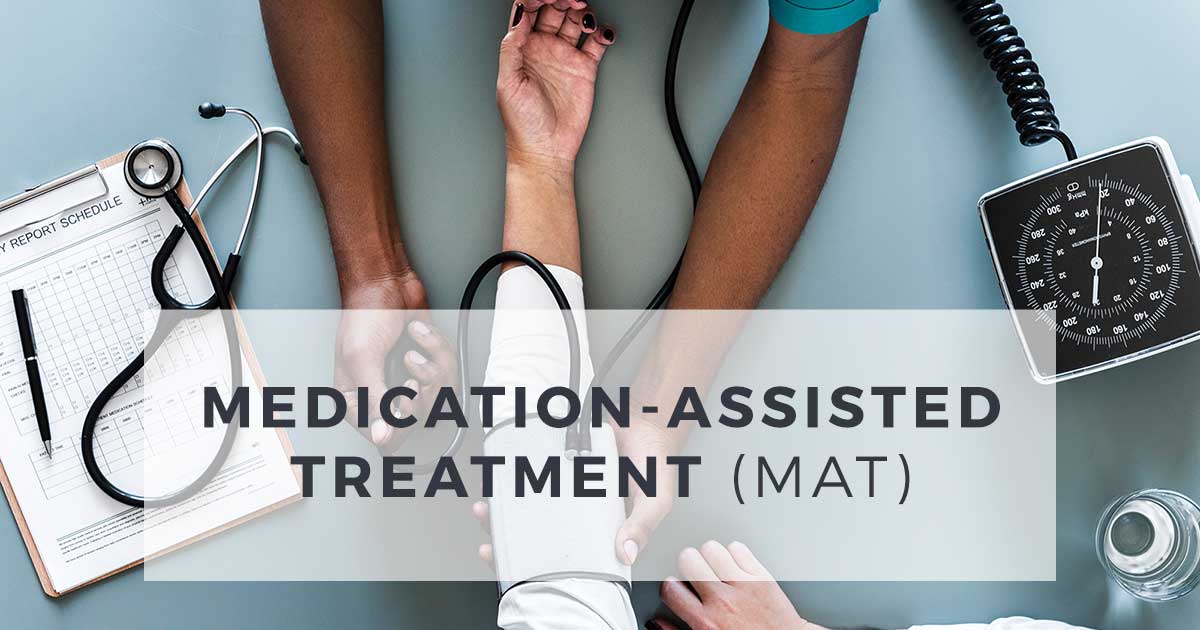The Process Recovery Center is pleased to be a provider of Medication-Assisted Treatment (MAT) in the Southern New Hampshire and Greater Boston region. At our Nashua, New Hampshire drug rehab, we employ a variety of techniques to aid in your recovery, including Suboxone MAT treatment, as an addition to your PHP or IOP program participation.

At The Process Recovery Center, we acknowledge that the combination of medication and behavioral therapy can treat addiction. The medication staves off the physical symptoms, withdrawal and cravings. The counseling helps patients address their emotional and behavioral issues associated with addiction. Evidence-based research shows that neither one is as effective on their own as they are together.
Before we can talk about why or how MAT works, it is critical to understand that over the last decades it has become more clear that opioid addiction is a chronic disease. According to the National Institute on Drug Abuse (NIDA):
“Addiction is defined as a chronic, relapsing brain disease that is characterized by compulsive drug seeking and use, despite harmful consequences. It is considered a brain disease because drugs change the brain—they change its structure and how it works. These brain changes can be long-lasting, and can lead to the harmful behaviors seen in people who abuse drugs.” — NIDA. Drugs, Brains, and Behavior: The Science of Addiction.
Studies indicate that physical changes in important decision making areas of the brain are brought on by long-term opioid abuse, which further diminishes an addict’s ability to control their demand for more. According to a Harvard Health Publication:
“The hippocampus and the amygdala store information about environmental cues associated with the desired substance, so that it can be located again. These memories help create a conditioned response—intense craving—whenever the person encounters those environmental cues.”
Different people have different triggers. Some might feel the “conditioned response” when they drive by a certain location, others might feel a trigger when they are with old friends with whom they used to consume drugs. Some who used to inject heroin, report that they feel a strong craving when they touch tin foil. The research shows that these responses are due to physical changes to their brains as a result of addiction. Researchers have understood this for almost two decades now, as an article from 2000 in the Journal of American Medicine points out:
“Drug dependence produces significant and lasting changes in brain chemistry and function. . . . Drug dependence generally has been treated as if it were an acute illness. Review results suggest that long-term care strategies of medication management and continued monitoring produce lasting benefits. Drug dependence should be insured, treated, and evaluated like other chronic illnesses.”
Treating the disease, defined as “opioid use disorder”, through Medication Assisted Treatment, improves outcomes. What are those outcomes? According to the Substance Abuse and Mental Health Services Administration (SAMHSA), Medication Assisted Treatment:
- Improves patient survival
- Increases retention in treatment
- Decreases illicit opiate use and other criminal activity
- Increases patient ability to gain and maintain employment
- Improves birth outcomes among women with substance use disorders
The medication part of MAT works by relieving the physical withdrawal symptoms and cravings. It does so by replacing the abused opioids with a medication that fills the same receptors in the brain that drive addictive behavior. When properly dosed, there are no adverse effects on patients’ mental, intellectual, or physical functioning
The therapy part of MAT works by allowing patients to address the mental health and behavioral issues that surround their addiction. Patients can:
- Improve insights into behaviors that led to addiction and the problems that addiction caused
- Learn to replace unhealthy behaviors with healthier ones
- Work to repair relationships
- Provide encouragement and motivation to stick to recovery plan
- Learn to recognize and avoid craving triggers
- Learn how to better manage stress
- Learn how to avoid relapse—strategies
- Find a community that is struggling with similar issues
If you or someone you love is struggling with opioid addiction, contact us today for a free, confidential assessment. Don’t wait.
